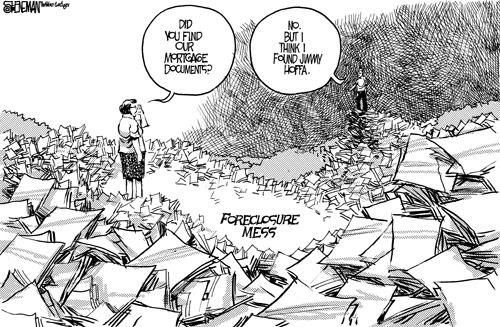(2 pm. – promoted by ek hornbeck)
 On January 7, the Too-Big-To-Fail Banks got some really dreadful news in the form of a ruling from the Commonwealth of Massachusetts Supreme Court.
On January 7, the Too-Big-To-Fail Banks got some really dreadful news in the form of a ruling from the Commonwealth of Massachusetts Supreme Court.
The state supreme court has ruled against the banks and upheld a lower court order that nullified foreclosures by US Bancorp and Wells Fargo, on the grounds that neither bank had the legal right under Massachusetts law to foreclose. Today’s ruling has far-reaching consequences for the banks and the housing market in general, as it throws into serious question the legal soundness of millions of mortgages in the US if, as expected, courts in other states come to similar conclusions as the Supreme Judicial Court of Massachusetts.
This is not new and, as ek hornbeck explained in his diary, not easily appealed. This has set the banks scrambling for solutions because they may now be liable for trillions of dollars and, very possibly, insolvency.
One proposal is from a Wall St./Bank think tank, The Third Way, which has some very close ties to the White House. President Obama’s new Chief of Staff, Bill Daley, as on its board of directors. Can you see where this is going? Right, another bank bailout at the expense of the tax payer and, as proposed by The Third Way, undermining fundamental property law that our entire economic system is based on:
This proposal guts state control of their own real estate law when the Supreme Court has repeatedly found that “dirt law” is not a Federal matter. It strips homeowners of their right to their day in court to preserve their contractual rights, namely, that only the proven mortgagee, and not a gangster, or in this case, bankster, can take possession of their home.
This sort of protection is fundamental to the operation of capitalism, so it’s astonishing to see neoliberals so willing to throw it under the bus to preserve the balance sheets of the TBTF banks. Readers may recall how we came to have this sort of legal protection in the first place. England learned the hard way in the 17th century what happens with low documentation requirements: abuse of court procedures, perjury and corruption become the norm. Parliament enacted the 1677 Statute of Frauds to establish higher standards for contracts, such as witnessing by a third party, to stop the widespread theft of property that was underway.
The memo completely ignores the harm to investors from the bank mistakes and lacks any provisions for damage to investors to be remedied. Moreover, denying borrower rights removes their leverage to obtain deep principal mortgage modifications, which for viable borrowers produces lower losses than costly foreclosures and sales of distressed property. Thus this shredding of contractual protections in mortgages not only hurts borrowers but also harms investors.
So to save the banks from their own, colossal abuses of contracts that they devised, the Third Way document advocates Congressional intervention into well established, well functioning state law. This is a case where these matters can and should be left to the courts and ultimately state AGs to coordinate the template of a more broadbased solution.
Mike Lux at Open Left points out two simple solutions:
To once again bail out the bankers, this time by changing real estate law in a way that hasn’t been done since the 1670s, would be a far bigger deal than even the trillions in bailout dollars the TARP and Fed gave these banks in 2008/9. But the bankers and their allies like Third Way will try to present this as a simple fix to some minor paperwork problems. Look, if these paperwork problems were so minor, we wouldn’t need the fix they are proposing: the banks would get nicked a little in a few cases where they screwed up a little bit of paperwork, and everyone would go on their way. But they have made a Texas-sized mess of the entire mortgage title system in their haste to make money, and it is time to pay the piper.
What’s the solution? We should start with a foreclosure freeze while the government sorts through the mess and the state attorney generals finish their negotiations with the big banks. Clearly, a massive amount of mortgage write-downs to underwater homeowners to reflect current housing prices makes a ton of sense, and would dramatically cut the need for foreclosures, taking some of the pressure off the system. Once those two steps are taken, hopefully the AGs can cut a good deal for the American people to make things work better going forward.
The problem with sensible pro-middle class solutions like this is the incredible political power of these big banks. Here’s the deal, though: politicians hate the idea of having to bail these guys out again. If progressives can make clear that any legal changes the bankers are trying to push through on mortgage and title law are just one more big bailout of the big banks, we can win this fight. Let’s hope we do, because the stakes are pretty damn high.
Some of that “incredible political power” now has the very close daily attention of President Obama. As Han Solo would say, I’ve got a bad feeing about this.

3 comments
Author